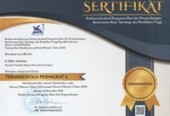Legitimacy as a Precondition for the Recognition of New Governments: A Case of Libya
Abstract
Keywords
Full Text:
PDFReferences
Arimatsu and Mohbouda. 2014. “The Legal Classification of the Armed Conflicts in Syria, Yemen and Libya,” Chatham House.
Bangerter. 2011. “Reasons why Armed Groups Choose to Respect International Humanitarian Law or not,” International Review of the Red Cross.
Brierly,James leslie. 1963. The Law of Nations, Oxford: Clarendon Press.
Brownlie, Ian. 1998. Principles of Public International Law, Oxford: Oxford University Press.
Corbett, Percy E. 2015. The Growth of World Law. Princeton: Princeton University Press.
d`Aspremont. 2006. “Legitimacy of Governments in the Age of Democ-racy.” Journal of International Law and Politics.
Christie, Kennith and Denny Roy. 2001. The Politics of Human Rights in East Asia. London: Pluto Press.
Dixon, Martin and Robert Mc Corquodale. 2003. Cases and Materials in International Law, Oxford: Oxford University Press.
D. J. Harris, 2004, Cases and Materials in International Law, London: Sweet & Maxwell.
Fox, Gregory H. and Brad R. Roth. 2000. Democratic governance and International Law. UK: Cambridge University Press.
G. Pope, Atkins.1997. Encyclopaedia of the Inter-American System. Westport: Greenwood Publishing Group, Westport.
Grant,Thomas D. 1999. The Recognition of States: Law and Practice in Debate and Evolution, California: Praeger Publishers.
Hogger, Daniel. 2015. The Recognition of States, Musnter: LIT Verlag Munster.
Jennings, Robert and Arthur Watts KCMG. 1955. Oppenheim’s International Law, UK: Longman.
Joyner, Christopher C. 2005. International Law in the 21st Century: Rules for Global Governance. Oxford: Rowman & Littlefield.
Kufuor. 2002. “The OAU and the Recognition of Governments in Africa: Analysing its Practice and Proposals for the Future,” American International law review.
Lauterpacht, Hersch. 1947. Recognition in International Law. UK: Cambridge University Press.
M. J. Peterson. Recognition of Governments: Legal Doctrine and State Practice. London: Palgrave Macmillian. 1997.
Posner, Eric A. and Alan O. Sykes. 2013. Economic Foundations of International Law, Cambridge: Harvard University Press.
Raic, David. 2002. Statehood and the Law of Self-Determination, Boston: Martinus Nijhoff Publishers.
Ramcharan. 1997. “The International Conference on the Former Yugoslavia: Official Papers.” BRILL.
Shaw, Malcolm N. 2003. International Law. New York: Cambridge University Press.
Sithole. 2013. “The African Union Peace and Security mechanism‟s crawl from design to reality: Was the Libyan crisis a depiction of severe limitations?” African Journal on Conflict Resolution..
Sloane. 2006. “The Changing Face of Recognition in International Law: A Case Study of Tibet,” Emory Interna-tional Law Review.
Talmon. 2004. “Constitutive Versus The Declaratory Theory of Recognition: Tertium Non Datur?,” The British Yearbook of International Law.
Talmon,Stephan. 1999. Who is a Le-gitimate Government in Exile? To-wards Normative Criteria for Govern-mental Legitimacy in International Law, the Reality of International Law, Essays in Honour of Ian Brownlie. Ox-ford: Clarendon Press.
Van Essen, 2012. “De Facto Regimes in International Law,” Utrecht Journal of International and European law, 28.
Vidmar, Jure. 2009. Democracy and State Creation in International Law. Nottingham: University of Nottingham.
Vidmar. 2012. “Explaining the Legal Effects of Recognition,” International and Comparative Law Quarterly.
Von Glahn, Gerhard.2017. Law among Nations. New York: Taylor and Francis.
Wolfrum and Philip. 2002. “The Status of the Taliban: Their Obligations and Rights under International Law,” Max Planck Yearbook of United Nations Law.
Worster. 2009. “Law, Politics and the Conception of the State in State Recogni-tion Theory,” Boston University Interna-tional Law Journal.
DOI: http://dx.doi.org/10.28946/slrev.Vol2.Iss1.111.pp69-81
Refbacks
- There are currently no refbacks.

Sriwijaya Law Review (SLRev) ISSN: 2541-5298 | e-ISSN: 2541-6464 is licensed under a Creative Commons Attribution-ShareAlike 4.0 International License.






















